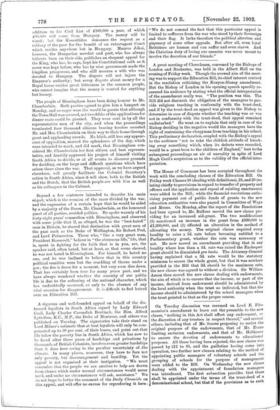A great meeting of Churchmen, convened by the Bishops of
London and Rochester, was held in the Albert Hall on the evening of Friday week. Though the avowed aim of the meet- ing was to support the Education Bill, its chief interest centred in the resolution criticising the Kenyon-Blaney amendment. But the Bishop of London in his opening speech speedily re- assured his audience by stating what the official interpretation of the amendment really was. " The position was this. The Bill did not diminish the obligation of the managers to pro- vide religious teaching in conformity with the trust-deed, and if by the trust-deed an appeal was given to the Bishop to determine in case of dispute whether the teaching was or was not in conformity with the trust-deed, that appeal remained undisturbed." He went on to explain that only in case of the Bishop deciding in the negative would the managers have the right of restraining the clergyman from teaching in his school. This preliminary declaration, coupled with the Bishop's appeal to the audience "not to take the childish attitude of knock- ing away something which, when its defects were remedied, would be a great boon to the children of England," lent to the subsequent proceedings an air of unreality in spite of Lord Hugh Cecil's scepticism as to the validity of the official inter- pretation.










































 Previous page
Previous page